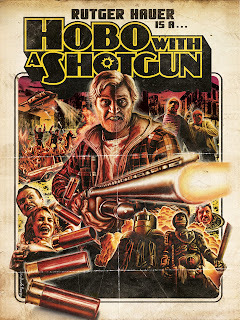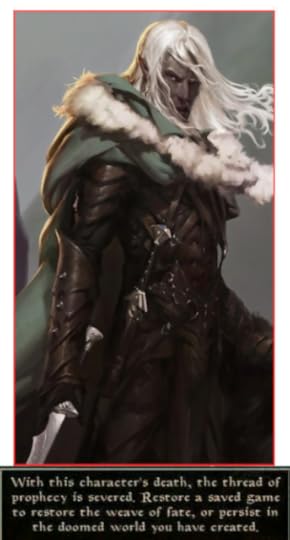In Defense of the Murderhobo
 Like any hobby, roleplaying games are replete with their own unique vocabulary and jargon. Spend any time with someone deeply invested in roleplaying and odds are good you'll soon encounter one or more words whose meaning would be impenetrable to outsiders. Even the title of this blog has its origins in RPG – and, before that, wargaming – argot that would make little or no sense to the average person.
Like any hobby, roleplaying games are replete with their own unique vocabulary and jargon. Spend any time with someone deeply invested in roleplaying and odds are good you'll soon encounter one or more words whose meaning would be impenetrable to outsiders. Even the title of this blog has its origins in RPG – and, before that, wargaming – argot that would make little or no sense to the average person. Occasionally, even someone who's been playing roleplaying games for as long as I have will come across a term whose meaning is unclear. Such is the case with "murderhobo," a word whose origins, I assumed, must be relatively recent, since it's not one with which I was familiar. A quick search online reveals that "recent" in this case is relative, since "murderhobo" has been commonplace in online discussions of Dungeons & Dragons for more than a decade now. Color me surprised!
Like "grognard" and "killer DM," "murderhobo" seems to have mostly negative associations. What interests me, as I delved more deeply into this, is how the term seems to have evolved since its initial coinage. At the start, the term appears to have been a partly affectionate jab at the style of play that some claim was the default at the dawn of the hobby: rootless wanderers employing violence to enrich themselves.
 DCC RPG has made murderhoboism its brandThis post is not the place to rehash arguments for or against how people in the early days actually played RPGs. For our present purposes, all that matters is that plenty of people not only believe that the first gamers played games in this way but also that this style of play is, at best, laughable and, at worst, objectionable. Despite the contemporary origins of the term, this censorious attitude toward murderhoboism isn't limited to players of more recent vintage. Even within the old school realm, deprecation of the murderhobo is far from unknown.
DCC RPG has made murderhoboism its brandThis post is not the place to rehash arguments for or against how people in the early days actually played RPGs. For our present purposes, all that matters is that plenty of people not only believe that the first gamers played games in this way but also that this style of play is, at best, laughable and, at worst, objectionable. Despite the contemporary origins of the term, this censorious attitude toward murderhoboism isn't limited to players of more recent vintage. Even within the old school realm, deprecation of the murderhobo is far from unknown.That having been said, there is a criticism of murderhoboism that does seem to originate among newer gamers. This criticism focuses on the way that murderhobo characters can derail a referee's carefully constructed campaign. Their acts of random violence represent an unwillingness to commit fully to the "story" the referee is attempting to tell and is thus worthy of rebuke. While I am generally quite dismissive of referees who mistakenly think it's their job to tell a story, I am nevertheless mildly sympathetic to any referee who has to deal with needlessly disruptive players.
 Note the adverb: needlessly. Sometimes, players are disruptive for a very good reason. I have personally been involved in sessions where my fellow players decided to barricade a tavern and then burn it down, its patrons still inside, as an act of rebellion against the referee, whose heavy-handed plot they could no longer stand. They were, according to this second understanding of the term, murderhobos, because they derailed the referee's game with their violent antics.
Note the adverb: needlessly. Sometimes, players are disruptive for a very good reason. I have personally been involved in sessions where my fellow players decided to barricade a tavern and then burn it down, its patrons still inside, as an act of rebellion against the referee, whose heavy-handed plot they could no longer stand. They were, according to this second understanding of the term, murderhobos, because they derailed the referee's game with their violent antics.I'm afraid I don't have much time for the first criticism of murderhoboism. Most of the protagonists of the pulp fantasy stories that inspired Arneson and Gygax could probably be called murderhobos, in at least some of their adventures. I find it difficult to look askance at any player inspired by Conan, Fafhrd, or the Gray Mouse – never mind Elric, many of whose yarns begin and/or end with random acts of violence on his part. Certainly, this isn't the only way to play Dungeons & Dragons, nor even my preferred one, but I don't see anything wrong with it and indeed know firsthand that it can be quite fun. Like so many things, I think what's really needed is not so much disdain for so-called murderhoboism as clearer agreement between players and the referee about the kind of game they wish to play.
I've already addressed the narrow sense in which I can give credence to the second type of criticism. That said, I have very little patience for referees who want, above all, to "tell a story," more specifically their story. One of my strongest beliefs about roleplaying is that it is a collaborative entertainment, where the wishes of neither the referee nor the players are supreme. Consequently, "story" is, at best, an emergent property recognizable only after the fact, an attempt to make sense of the unexpected twists and turns arising from the interactions of all involved and the randomness of dice rolls. Anyone who places his own prefabricated narrative above the glorious riot of player choice (even stupid choice) deserves to be terrorized by murderhobos.
In the end, I'm not sure murderhobos need defending, so much as understanding of what they are and why someone might wish to play D&D (or any other RPG) in that style. Mind you, I think that's the case with nearly every style in which one might play, but what do I know?
James Maliszewski's Blog
- James Maliszewski's profile
- 3 followers



